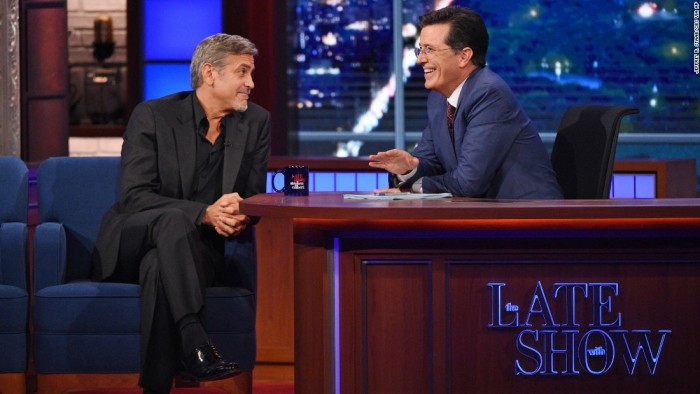SInce the days of Johnny Carson, the format of late night talk shows hasn’t changed much. Working with some variation of the ‘opening monologue, guest one, guest two, pre-recorded bit, musical guest, goodnight’ formula has proven to be ironically versatile. A revolving door of new hosts has also helped prevent this formula from going stale. In its first week, The Late Show with Stephen Colbert, the newest addition to the late night roster, has followed the precedent his forebearers have set, though not necessarily to a fault.
This switch from Comedy Central newsroom to late night standard is an odd change for fans of the right-wing blowhard that Colbert played on The Colbert Report for nine years. In fact, he’s gone from a persona that was an exercise in winking irony to one that seems much more earnest and probably closer to his own personality. It’s clearly a big adjustment to make, and the transition comes with a few hiccups. Some of the jokes seem toothless and geared towards a more family-friendly audience, as if he’s trying to reign himself in and prevent saying something that could potentially alienate some of CBS’ older viewer base. Still, it’s reassuring to see that his monologues are mostly geared towards the political humour that he’s known for.
It’s no surprise, then, that his political interviews are the segment of his show with the most promise. He takes an interview strategy of trying to find the human being behind the political façade, something that most other talk shows would steer away from. Admittedly, he had trouble finding a way to make Jeb Bush seem interesting or human throughout a flat and choppy interview. In contrast his interview with Vice-President of the United States Joe Biden revealed a sense of emotional vulnerability and empathy that is rare in politicians as the two shared stories of the loved ones that they’ve lost. Biden telling anecdotes about the inherent goodness of his recently-deceased son was simultaneously heartbreaking and life-affirming, as well as something that wouldn’t seem possible on any other current late night show.
On the other hand, the celebrity interviews are the most inconsistent part of the show. Part of this comes with the territory; for whatever reason the charm that some actors give off in films doesn’t extend to the relatively more spontaneous late night format. An interview with Scarlett Johansson, for instance, ended up becoming a conversation between two people who seem nice, but have absolutely nothing interesting to say to each other.
Interviews with other people tend not to hinge on how interesting the subject is, but the quality of the questions Colbert asks, which is an essential part of being a good host. An interview with Uber CEO, Travis Kalanick, is successful entirely because Colbert peppers him with a series of incisive questions about the ethics of Uber’s business practices. Another chat with comedian Amy Schumer is successful partially because Colbert is able to play the straight man in her hilarious anecdotes. Segments like these show that Colbert is already playing in a different league than the more effusive pandering of his late night counterparts, Jimmy Fallon or Jimmy Kimmel. Part of this is the extensive experience he has from his previous show, and part is the commitment to showmanship that he clearly takes very seriously.
Most of the flaws that seem inherent to this show are due to the fact that new late night hosts are works in progress. Studios are used to buying such long contracts with them under the assurance that hosts will get better with more time. Even a seasoned veteran like Colbert has to take some time getting used to an expanded and altered format on another network. Despite first-week creaks here and there, Colbert presents the platonic ideal of what a traditional late-night show can be.








